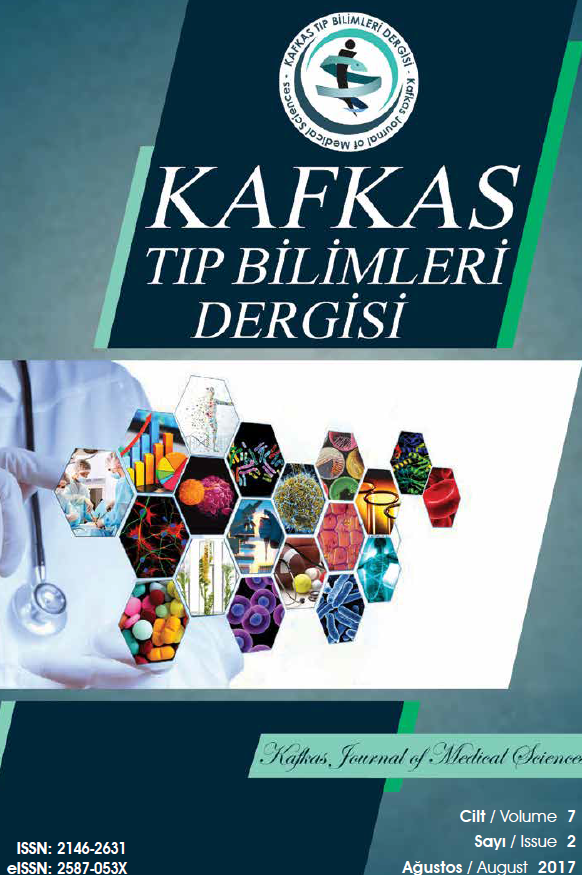Myastenik ve Non-Myastenik Timus Tümörlerinde Genişletilmiş Timektomi İşleminin Sonuçları
timoma; timektomi; video yardımlı torakoskopik cerrahi; sternotomi; sağkalım
Outcomes of Extended Thymectomy in Myasthenic and Non-Myasthenic Thymus Tumors
___
- 1. Levine GD, Rosai J. Thymic hyperplasia and neoplasia: a review of current concepts. Hum Pathol 1978;9:495–515. 2. Qu YJ, Liu GB, Shi HS, et al. Preoperative CT findings of thymoma are correlated with postoperative Masaoka clinical stage. Acad Radiol 2013;20:66–72. 3. Yim AP. Video-assisted thoracoscopic resection of anterior mediastinal masses. Int Surg 1996;81, 350–53. 4. Cheng YJ, Kao EL, Chou SH. Videothoracoscopic resection of stage II thymoma: prospective comparison of the results between thoracoscopy and open methods. Chest 2005;128:3010–12. 5. Qian L, Chen X, Huang J, Lin H, Mao F, Zhao X, et al. A comparison of three approaches for the treatment of earlystage thymomas: robot-assisted thoracic surgery, videoassisted thoracic surgery, and median sternotomy. J Thorac Dis 2017;9:1997. 6. Masaoka A, Monden Y, Nakahara K, et al. Follow-up study of thymomas with special reference to their clinical stages. Cancer 1981;48:2485–92. 7. Kirchner T, Muller-Hermelink HK. New approaches to the diagnosis of thymic epithelial tumors. Prog Surg Pathol 1989;10:167–89. 8. Rosai J. Histological typing of tumours of the thymus. In: WHO International histological classification of tumours, 2nd Ed. New York: Springer-Verlag, 1999:5–15. 9. Detterbeck F, Youssef S, Ruffini E, Okumura M. A review of prognostic factors in thymic malignancies. J Thorac Oncol 2011;6:1698–704. 10. Detterbeck F, Parsons A. Thymic tumors: a review of current diagnosis, classification, and treatment, in: J. Patterson, J. D. Lerut, T. W. Luketich, F. G. Rice (Eds.), Thoracic and Esophageal Surgery, 3rd ed., Elsevier, Philadelphia, 2008;1589–614. 11. Detterbeck FC, Zeeshan A. Thymoma: current diagnosis and treatment, Chin Med J (Engl)2013;126:2186–91. 12. Di Crescenzo V, Laperuta P, Garzi A, Napolitano F, Cascone A, Vatrella A. Small cell lung cancer associated with solitary fibrous tumors of the pleura: a case study and literature review. Int J Surg 2014;12(1):19–21. 13. Friedant AJ, Handorf EA, Su S, Scott WJ. Minimally invasive versus open thymectomy for thymic malignancies: systematic review and meta-analysis. J Thorac Oncol 2016;11:30–38. 14. Fiorelli A, Mazzella A, Cascone R, Caronia FP, Arrigo E, Santini M. Bilateral thoracoscopic extended thymectomy versus sternotomy. Asian Cardiovasc Thorac Ann 2016;24:555–61. 15. Durmuş B, Kaya FN, Gören S, Acay G, Özden S, Şentürk S. Miyastenia Gravisli Olgularda Timektomi Uygulamasında Peroperatif Anestezi Yönetiminin Retrospektif Değerlendirilmesi. GKDA Derg 2014;20:154–61. 16. Kalita J, Kohat AK, Misra UK. Predictors of outcome of myasthenic crisis. Neurol Sci 2014;35:1109–14. 17. Xue L, Wang L, Dong J, Yuan Y, Fan H, Zhang Y, et al. Risk factors of myasthenic crisis after thymectomy for thymoma patients with myasthenia gravis. Eur J Cardio-Thoracic Surg 2017;52:692–7. 18. Toker A, Özkan B. Video Yardımlı Torakoskopik Timektomi. Türkiye Klinikleri özel sayısı 2009;2:78–83. 19. Manoly I, Whistance RN, Sreekumar R, Khawaja S, Horton JM, Khan AZ, et al. Early and mid-term outcomes of transsternal and video-assisted thoracoscopic surgery for thymoma. Eur J Cardio-Thoracic Surg 2014;45:187–93. 20. Liman T, Taştepe İ, Demircan S, Topçu S, Çetin, G, Kuzucu A. Timomalarda tedavi ve prognoz. Türk Göğüs Kalp Damar 2000;10:793–96. 21. Odaka, M, Tsukamoto Y, Shibasaki T, Mori S, Asano H, Yamashita M, et al. Surgical and oncological outcomes of thoracoscopic thymectomy for thymoma. J Visualised Surg 2017;3:54. 22. Kirmani BH, Mazhar K, Saleh HZ, Ward AN, Shaw M, Fabri BM, et al. External validity of the Society of Thoracic Surgeons risk stratification tool for deep sternal wound infection after cardiac surgery in a UK population. Interact Cardiovasc Thorac Surg 2013;17:479–84. 23. Toker A, Sonett J, Zielinski M, Rea F, Tomulescu V, Detterbeck FC. Standard terms, definitions, and policies for minimally invasive resection of thymoma. J Thorac Oncol 2011;6:1739–42.
- ISSN: 2146-2631
- Yayın Aralığı: Yılda 3 Sayı
- Başlangıç: 2011
- Yayıncı: Kafkas Üniversitesi
Ağrı Patofizyolojisinde Voltaj Kapılı Kalsiyum Kanallarının Rolü
Histerektomi Olgularında Adenomyozis İnsidansı
Yakup BAYKUŞ, Rulin DENİZ, Ebru ÇELİK KAVAK, Hasan ÇILGIN, Haldun ARPACI, Nazan ARDIÇ, Ömür ÖZTÜRK
Bülent KATI, Kemal GÜMÜŞ, Hasan Anıl KURT
Sleeve Gastrektominin Nadir Tanımlanan Bir Komplikasyonu; Kinkleşme
Myastenik ve Non-Myastenik Timus Tümörlerinde Genişletilmiş Timektomi İşleminin Sonuçları
Ezel ERŞEN, Hasan Volkan KARA, Burcu KILIÇ, Mehlika İŞCAN, Akif TURNA, Kamil KAYNAK
Korpus Kallozum Spleniumda Görülen Geçici Beyin Lezyonun Klinik ve Radyolojik Önemi: 2 Olgu Sunumu
Fettah EREN, Gözde ÖNGÜN, Şerefnur ÖZTÜRK
Aksiller Lenfanjiomu Olan Bir Yenidoğanda Lokal Bleomisin Tedavisi: Olgu Sunumu
Profilaktik Servikal Serklaj Başarısını Etkileyen Faktörler
İnflamatuar Barsak Hastalıklarının Aktivasyonunda İnflamasyon ile Hemogram Parametrelerinin İlişkisi
Ece Sivrel UZUN, Engin Ersin ŞİMŞEK, Sabah TÜZÜN, Ekrem ORBAY, Emel EMEL AHISHALI, Mustafa Reşat MUSTAFA REŞAT DABAK
